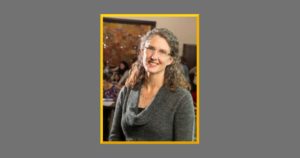In 1995, her new PhD in hand, Anne Basting took the elevator to the ninth floor of Curtin Hall to begin her first-ever job in academia as a fellow in UWM’s Center for 21st Century Studies. She was concentrating on Age Studies as she developed her dissertation into a book.
In 2021, she took that same elevator ride up to the C21 offices on the ninth floor. Everything was just as she remembered it – the same stunning view of Lake Michigan, the same office spaces, the same sense of purpose she felt when she first walked in all of those years ago.
But this time, Basting isn’t a fellow; she’s the C21 director.
“It really is full-circle,” she said with a smile.
Basting, a professor in the Department of English, took over the position this year after English Professor Richard Grusin stepped down as the Center’s director. Grusin left large shoes to fill, Basting said, and to add to the challenge, C21 is also without an assistant director at this time.
But in those challenges lie opportunities, and Basting plans to make the most of them as she beings her leadership.
Focusing on the mission
UWM’s Center for 21st Century Studies was founded as the Center for 20th Century Studies in 1968 (the name changed as the date did) as a place to engage collaborative groups of scholars across those fields to address the most pressing contemporary issues.
“Before I (became a candidate for director), I did a lot of research on where humanities centers are nationally and what’s happening. In general, there’s a powerful turn towards public engagement, which is what I do,” Basting noted.
In particular, Basting works with public engagement around issues with aging and disability. She is the founder of the nonprofit TimeSlips, which works to help people form meaningful connections and engage with seniors all the way to the end of life. TimeSlips was actually developed during her second fellowship in C21, sponsored by the Brookdale Foundation.
To begin her mission of fostering public engagement with C21 itself, Basting went right to the source: The actual public.
“My process I call ‘spiraling conversations.’ I start with a conversation, and that conversation leads me to another one and another one and another one. It’s a deep learning process and the conversations all build off of each other,” Basting explained. “I started that with key players, former fellows, advisory folks, heads of departments and key community people associated with the center.”
She also sent out a survey that faculty and community members could answer anonymously. Basting asked: What research are you doing? What research do you wish you were doing? What issues are at the top of your heart and mind right now?
“We’re building our plan from that survey. We’re identifying different interest clusters and themes of the research people are doing, different methodologies people are interested in using. Then we’ll use those interest clusters to bring people together and offer programming for the center,” she said.
Changes in C21
One of Basting’s first acts as director was to bring on a lead faculty advisor for C21. Art history professor Jennifer Johung is partnering
with Basting to bring a critical theory perspective to the Center and lead C21’s advisory council.
Both women have been thinking of ways to incorporate the survey responses into meaningful avenues of connection and research for C21 stakeholders. So far, Basting said, they have identified several areas where UWM faculty, researchers, and Milwaukee community members have things in common. In particular, she noted, respondents were interested in projects concerning health, the environment, and democracy and citizenship. They were interested in varying research methods from storying to playing to decolonizing to organizing.
“An idea that Jennifer and I put forth is that we’re going to … cross-pollinate those interests. Say, healthenvironmentstorying, or democracyplaying,” Basting said. “Rather than seeing people in disciplines, we see them according to those themes or methods. Then we can play with them and bring people together in ways that are going to surprise us.”
To foster those connections, Basting approached College of Letters & Science Dean Scott Gronert to ask for his support for Collaboratory Funding, UWM monies designed to bolster interdisciplinary research. Basting hopes that funding and the identification of those interest areas will bring people together after the forced separation of the COVID-19 pandemic.
A new project
These are grand goals that will take time to accomplish, but in the meantime, Basting has one project up and running, and it’s one that’s literally open to the community.
Basting remembers how she was struck by the space and the view when she first walked into the C21 offices all of those years ago. When she walked back in, she was a bit dismayed to see that the space was exactly the same as she’d left it.
“So, we’re putting together a Space Committee. We’re going to look at how to make the mission manifest in the space,” Basting said.
The first phase of that project is a curated exhibit of the existing C21 offices called ‘Talking Walls.’ Campus and community members are invited to tour the ninth floor of Curtin Hall and leave suggestions on post-It notes for changes to the space.
“We’ll also have the images and curatorial cards on our Instagram page and invite feedback on our Instagram page for people gathering stories and ideas for transformation,” Basting said.
The next step to transform the offices is a new coat of paint and some furniture. Eventually, some walls might even come down or offices moved around.
Until then, said Basting, C21 remains a place where people can come together and work on the biggest issues facing humanity.
“To me, it’s in collaboration where there’s innovation and new ideas and energy, and that is exactly what we need right now.”
By Sarah Vickery, College of Letters & Science
